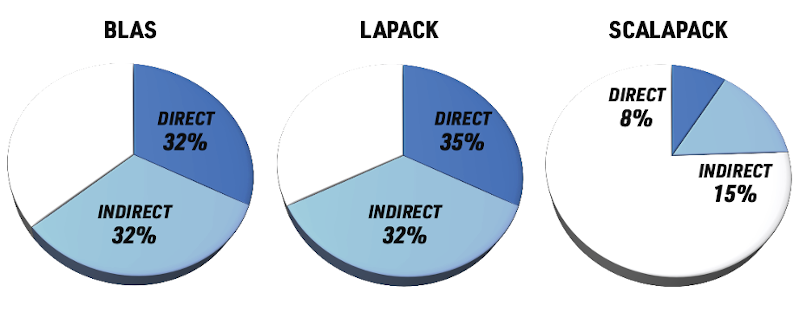Software for Linear Algebra Targeting Exascale
Innovative Computing Laboratory
University of Tennessee
[TOC]
Software for Linear Algebra Targeting Exascale (SLATE) is being developed as part of the Exascale Computing Project (ECP), which is a joint project of the U.S. Department of Energy's Office of Science and National Nuclear Security Administration (NNSA). SLATE will deliver fundamental dense linear algebra capabilities for current and upcoming distributed-memory systems, including GPU-accelerated systems as well as more traditional multi core-only systems.
SLATE will provide coverage of existing LAPACK and ScaLAPACK functionality, including parallel implementations of Basic Linear Algebra Subroutines (BLAS), linear systems solvers, least squares solvers, and singular value and eigenvalue solvers. In this respect, SLATE will serve as a replacement for LAPACK and ScaLAPACK, which, after two decades of operation, cannot be adequately retrofitted for modern, GPU-accelerated architectures.
SLATE is built on top of standards, such as MPI and OpenMP, and de facto-standard industry solutions such as NVIDIA CUDA and AMD HIP. SLATE also relies on high performance implementations of numerical kernels from vendor libraries, such as Intel MKL, IBM ESSL, NVIDIA cuBLAS, and AMD rocBLAS. SLATE interacts with these libraries through a layer of C++ APIs. This figure shows SLATE's position in the ECP software stack.
The charts shows how heavily ECP applications depend on dense linear algebra software. A direct dependency means that the application's source code contains calls to the library's routines. An indirect dependency means that the application needs to be linked with the library due to another component depending on it. Out of 60 ECP applications, 38 depend on BLAS - either directly on indirectly - 40 depend on LAPACK, and 14 depend on ScaLAPACK. In other words, the use of dense linear algebra software is ubiquitous among ECP applications.
- INSTALL.md for installation notes.
- Users' Guide
- Developers' Guide
- Tutorial with sample codes for using SLATE
- SLATE Function Reference
- SLATE Website and Papers
For assistance, visit the SLATE User Forum at https://groups.google.com/a/icl.utk.edu/forum/#!forum/slate-user. Join by signing in with your Google credentials, then clicking Join group to post.
Bug reports can be filed directly on GitHub's issue tracker: https://github.com/icl-utk-edu/slate/issues.
- Visit the SLATE website for more information about the SLATE project.
- Visit the SLATE Working Notes to find out more about ongoing SLATE developments.
- Visit the BLAS++ repository for more information about the C++ API for BLAS.
- Visit the LAPACK++ repository for more information about the C++ API for LAPACK.
- Visit the ECP website to find out more about the DOE Exascale Computing Initiative.
The SLATE project welcomes contributions from new developers. Contributions can be offered through the standard GitHub pull request model. We strongly encourage you to coordinate large contributions with the SLATE development team early in the process.
This research was supported by the Exascale Computing Project (17-SC-20-SC), a joint project of the U.S. Department of Energy's Office of Science and National Nuclear Security Administration, responsible for delivering a capable exascale ecosystem, including software, applications, and hardware technology, to support the nation’s exascale computing imperative.
This research uses resources of the Oak Ridge Leadership Computing Facility, which is a DOE Office of Science User Facility supported under Contract DE-AC05-00OR22725. This research also uses resources of the Argonne Leadership Computing Facility, which is a DOE Office of Science User Facility supported under Contract DE-AC02-06CH11357.
Copyright (c) 2017-2023, University of Tennessee. All rights reserved.
Redistribution and use in source and binary forms, with or without modification, are permitted provided that the following conditions are met:
-
Redistributions of source code must retain the above copyright notice, this list of conditions and the following disclaimer.
-
Redistributions in binary form must reproduce the above copyright notice, this list of conditions and the following disclaimer in the documentation and/or other materials provided with the distribution.
-
Neither the name of the University of Tennessee nor the names of its contributors may be used to endorse or promote products derived from this software without specific prior written permission.
This software is provided by the copyright holders and contributors "as is" and any express or implied warranties, including, but not limited to, the implied warranties of merchantability and fitness for a particular purpose are disclaimed. In no event shall the copyright holders or contributors be liable for any direct, indirect, incidental, special, exemplary, or consequential damages (including, but not limited to, procurement of substitute goods or services; loss of use, data, or profits; or business interruption) however caused and on any theory of liability, whether in contract, strict liability, or tort (including negligence or otherwise) arising in any way out of the use of this software, even if advised of the possibility of such damage.


